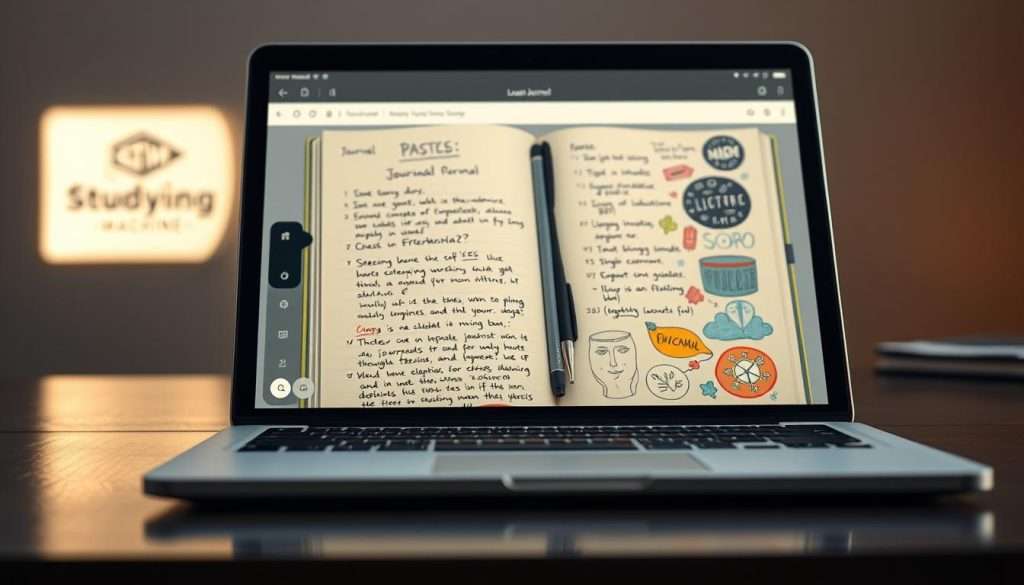We all have a spark of creativity inside us, waiting to be ignited. For ages, artists, writers, and thinkers have used journaling to tap into their imagination. By putting pen to paper, you can unlock your creative potential, just like Leonardo da Vinci and Frida Kahlo.
Starting a journaling practice helps you clarify your thoughts and explore your passions. It lets you develop your unique voice. We’ll guide you on this exciting journey, offering inspiration and guidance to make journaling a meaningful part of your life.
Key Takeaways
- Discover how journaling can help you tap into your creative potential
- Learn the benefits of journaling for self-expression and personal growth
- Get started with practical tips and inspiration for your journaling journey
- Understand how journaling can help you clarify your thoughts and develop your unique voice
- Explore the creative possibilities of journaling and unlock your imagination
What is Journaling and Why Should You Start?
In today’s fast world, journaling lets us slow down and think about our lives. It’s a way to deal with the stress of modern life. Journaling helps us express our thoughts, feelings, and experiences.
Defining Modern Journaling
Modern journaling includes many ways to write and express ourselves. It can be traditional writing, digital logging, or even art. At its heart, journaling is about recording our thoughts and feelings to learn and grow.
The Science Behind Putting Thoughts on Paper
Studies show that writing down our thoughts can greatly improve our mental health. Journaling can lower stress, help us understand ourselves better, and boost emotional smarts. By writing down our thoughts, we can gain insight and see things more positively.
Who Can Benefit from a Journaling Practice
Journaling is for everyone, no matter who you are. It can help students do better in school, professionals manage stress, or anyone looking for a creative outlet. Journaling can be adjusted to fit your life and needs.
| Benefits of Journaling | Description |
|---|---|
| Reduces Stress | Journaling helps process emotions, leading to a calmer state of mind. |
| Improves Self-Awareness | By reflecting on experiences, individuals gain a deeper understanding of themselves. |
| Enhances Creativity | Journaling can foster creativity through writing, drawing, and brainstorming. |
Exploring journaling shows it’s great for our mental and emotional health. By making journaling a part of our daily lives, we can reach our full potential. We become more mindful, creative, and resilient.
The Transformative Benefits of Journaling
Journaling offers many benefits, including better mental health, creativity, and self-awareness. It helps you understand yourself and your role in the world. By writing down your thoughts and feelings, you gain a deeper insight into your life.
Mental Health Improvements
Studies show that journaling can improve mental health. It can help reduce anxiety and depression symptoms. This is because:
Stress Reduction and Anxiety Management
Writing down your worries can calm your mind. Journaling helps you identify patterns and triggers. This way, you can find better ways to cope with stress.
Processing Difficult Emotions
Journaling is a safe space to explore your emotions. It helps you understand and work through tough experiences. Dr. James Pennebaker, a renowned researcher on journaling, says, “Writing about traumatic experiences can lead to significant improvements in mental and physical health.”
“The goal of journaling is to understand yourself, not to create a work of art.”
Enhanced Creativity and Problem-Solving
Journaling can also boost your creativity and problem-solving skills. By freewriting and brainstorming, you can find new ideas and solutions.
| Benefits | Description |
|---|---|
| Mental Clarity | Journaling helps you process your thoughts and emotions, leading to greater mental clarity. |
| Creativity Boost | Freewriting and brainstorming in your journal can stimulate your creativity. |
| Self-Awareness | Reflecting on your experiences and feelings in your journal fosters a deeper understanding of yourself. |
Better Self-Awareness and Personal Growth
Through journaling, you can understand your values, goals, and motivations better. This self-awareness leads to personal growth and positive change. Regular reflection helps you identify areas for improvement and find ways to achieve your goals.
Essential Supplies for Your Journaling Journey
To enjoy journaling, you need the right tools. The journal you choose affects how you write and connect with your journal. It’s key to pick one that fits your style.
Choosing the Right Journal
Finding the perfect journal is a personal choice. It depends on what you like and need. Let’s look at some important factors to help you decide.
Lined vs. Unlined Pages
Lined pages help you stay organized. They’re great for those who like structure. Unlined pages, however, let you be creative. They’re perfect for bullet journaling or artistic writing.
Size and Portability Considerations
The journal’s size matters too. A small journal is easy to carry around. It’s perfect for jotting down thoughts anytime. A bigger journal gives you more room for creativity. Think about how you’ll use it to choose the right size.
Pens, Markers, and Other Writing Tools
The right writing tools make journaling better. Try out different pens and markers to find your favorites. Fine-tip pens are good for details, while colorful markers add flair.
Optional Creative Supplies
Want to make your journal more fun? Try adding stickers, washi tape, or stamps. These extras can make your journaling more creative and enjoyable.
Digital vs. Physical Journaling: Finding Your Perfect Medium
The debate between digital and physical journaling has been ongoing. The best choice depends on your personal preferences. Both methods have unique advantages, and some people prefer a hybrid approach.
Benefits of Traditional Paper Journals
Physical journaling offers a tactile experience that many find therapeutic. Writing on paper can be more intimate and engaging. It allows for a deeper connection with your thoughts and emotions.
Paper journals don’t require batteries or charging. This makes them accessible anywhere, anytime.
Advantages of Digital Journaling Apps
Digital journaling apps offer convenience, security, and flexibility. They let you record your thoughts and reflections anywhere, without a physical notebook. Many apps have features like password protection, tagging, and search functionality.
This makes it easy to organize and revisit your entries.
Hybrid Approaches for Modern Journalers
Some journalers combine both physical and digital methods. For example, they might use a physical journal for daily reflections and a digital app for recording specific events or milestones. Experimenting with different approaches can help you find what works best for you.

The choice between digital and physical journaling depends on your personal preferences and needs. By understanding the benefits of each, you can make an informed decision. Start journaling in a way that feels most comfortable and enjoyable to you.
Creating Your Perfect Journaling Environment
A well-crafted journaling space can become your sanctuary for self-expression and growth. To create this haven, consider a few key elements that will enhance your journaling experience.
Finding Your Ideal Space and Time
Find a quiet, comfortable spot for journaling without distractions. It could be a cozy corner in your home, a local park, or a quiet café. Consistency is key, so journal at the same time every day, whether morning or before bed.
Minimizing Distractions
To focus better, minimize distractions in your space. Turn off phone notifications and use tools or apps to stay on track. A peaceful atmosphere can greatly improve your journaling practice.
Setting the Mood for Reflection
Set the mood with elements that promote relaxation and reflection. Soft lighting, calming scents, or soothing music can help. Try different journaling techniques, like self-care journaling, to connect deeper with your journal.
Getting Started: First Steps in Journaling
Starting a journaling journey can be both thrilling and scary. But with the right help, you can do great. Remember, journaling is personal and can fit your life perfectly.
Overcoming the Blank Page Syndrome
The blank page can seem overwhelming. But it’s a hurdle many face. Try setting a timer for 5-10 minutes and write freely. Don’t worry about spelling or grammar. This helps you get used to writing down your thoughts.
Setting Realistic Expectations
It’s key to set realistic goals when starting to journal. You don’t need to write a lot every day. Begin with a few sentences and grow as you get more comfortable.
Your First Week of Journaling: A Day-by-Day Plan
Here’s a simple plan for your first week:
Day 1-3: Simple Reflection Exercises
- Day 1: Write about your goals and dreams.
- Day 2: Think about your daily routine and what you could improve.
- Day 3: Describe a place that’s special to you.
Day 4-7: Expanding Your Practice
- Day 4: Try a journaling prompt: “What would you do if you had a day off from work?”
- Day 5: Write about a challenge you’re facing and think of solutions.
- Day 6: Reflect on your relationships and who brings joy to your life.
- Day 7: Share your progress and thoughts on journaling so far.
By following this plan, you’ll start a journaling for beginners practice that brings you happiness.

Exploring Different Types of Journaling Practices
Journaling has many forms, each with its own benefits for personal growth and self-expression. You can find a journaling practice that fits your lifestyle and goals. This makes journaling a flexible and personal experience.
Gratitude Journaling
Gratitude journaling helps you focus on the positive by listing things you’re thankful for each day. It boosts mental well-being and life satisfaction. Just a few minutes each day can change your outlook on life.
Stream of Consciousness Writing
Stream of consciousness writing lets you write down your thoughts without stopping or editing. It clears your mind, processes emotions, and reveals your subconscious thoughts. It’s great for self-discovery and stress relief.
Bullet Journaling for Organization
Bullet journaling is a customizable system for note-taking, planning, and creativity. It uses symbols and layouts to organize tasks and goals. It’s perfect for those who like structure and flexibility in their journaling.
Self-Care Journaling for Wellbeing
Self-care journaling focuses on mental and emotional well-being. It includes practices that promote relaxation and self-awareness. This can include tracking habits, celebrating small wins, and reflecting on self-care activities.
Tracking Habits and Routines
Tracking your daily habits and routines helps you identify patterns and set realistic goals. It lets you understand your behaviors and make informed decisions for better well-being.
Celebrating Small Wins
Recognizing and celebrating your achievements, no matter how small, boosts confidence and motivation. It keeps you positive and focused on your progress.
Dream Journaling
Dream journaling records your dreams to tap into your subconscious mind. It offers insight into your thoughts, emotions, and desires. It can unlock creative inspiration and personal growth.
Goal-Setting Journals
Goal-setting journals help you clarify, plan, and achieve your objectives. They break down big goals into smaller steps. This creates a roadmap for success and tracks your progress.
Exploring different journaling practices is key to a successful habit. Find a method that resonates with you. Don’t be afraid to try different techniques until you find the perfect fit.
| Journaling Practice | Primary Benefit | Best For |
|---|---|---|
| Gratitude Journaling | Cultivates positivity | Improving mental well-being |
| Stream of Consciousness | Processes emotions | Stress relief and self-discovery |
| Bullet Journaling | Organizes tasks and goals | Productivity and planning |
| Self-Care Journaling | Promotes well-being | Relaxation and self-awareness |
“The goal of journaling isn’t to create a work of art, but to capture the essence of your thoughts and feelings.”
Powerful Journaling Techniques to Unleash Creativity
Unlocking your creative potential through journaling is easier than you think. The right techniques can make a big difference. Journaling can spark your imagination and help you bring new ideas to life.
Morning Pages Method
The Morning Pages method, made famous by Julia Cameron, is about writing down your thoughts in the morning. You don’t edit or censor yourself. This clears your mind and gets your creative juices flowing.
By doing this every day, you’ll see a big boost in your creativity and productivity.
Visual Journaling and Sketching
Visual journaling combines writing with art. It lets you express yourself in many ways. Adding sketches, doodles, or collaged images to your journal can stimulate your creativity.
Prompted Writing Exercises
Writing prompts can help you get past writer’s block and spark new ideas. You can find prompts online or make your own. This keeps you focused and explores different aspects of your creativity.
Mindfulness Journaling
Mindfulness journaling is about being present and observing your thoughts without judgment. It helps you become more aware and clear. There are special techniques within mindfulness journaling:
Present-Moment Awareness Practices
Being in the present moment can unlock your creative potential. Write about what’s around you, your feelings, or your surroundings. This grounds you in the present.
Sensory Observation Techniques
Use your senses to observe the world. Describe what you see, hear, smell, taste, and feel. This practice helps you appreciate the world more and inspires new ideas.
By adding these journaling techniques to your daily routine, you’ll unlock your full creative potential. Journaling is great for sparking new ideas, no matter if you’re an artist or just starting out.
75 Inspiring Journaling Prompts for Beginners
Journaling is a powerful tool for reflection and growth. The right prompts can make a big difference. It helps boost creativity, process emotions, and understand yourself better.
Self-Discovery Prompts
Self-discovery is key in journaling. It helps you understand your thoughts, feelings, and experiences. Try prompts like “What are your core values, and are you living in alignment with them?” or “Describe a moment when you felt truly happy and fulfilled.”
Creativity-Boosting Prompts
Journaling can unlock your creative side. Use prompts like “Design a new product or service that solves a problem you’re passionate about” or “Write a short story using only 50 words” to spark your creativity.
Emotional Processing Prompts
Journaling helps process emotions and work through tough times. Try prompts like “What are you grateful for today?” or “Describe a difficult experience and what you learned from it.”
Mental Health Support Prompts
Journaling supports mental health. Use prompts like “What self-care practices can you commit to this week?” or “Write about a time when you overcame a mental health challenge” to focus on your wellbeing.
Goal-Setting and Future-Focused Prompts
Journaling helps set and achieve goals. Try prompts like “What are your top three goals for the next quarter, and what steps can you take to achieve them?” or “Imagine yourself a year from now – what does your ideal life look like?”
By using these prompts, you can explore creativity, self-awareness, and personal growth. So why not try it? Grab a journal, pick a prompt, and start writing!
Overcoming Common Journaling Challenges
Journaling has many benefits, but we often face challenges. These can make it hard to keep up with journaling. Let’s look at some common problems and ways to solve them.
Dealing with Inconsistency
One big challenge is being consistent. To beat this, pick a specific time and place for journaling. Make it a daily habit by adding it to your routine.
Managing Privacy Concerns
Privacy worries can stop some from journaling. Use a locked journal or a digital app with a password. This way, your thoughts stay safe.
Working Through Writer’s Block
Writer’s block can be tough. Try prompts or freewriting to spark your creativity again.
Finding Time in a Busy Schedule
Busy lives make journaling hard. Start with just a few minutes each day. This makes it easier to fit into your schedule.
Handling Self-Criticism and Perfectionism
Remember, journaling is a place where you can be yourself without judgment. Be kind to yourself and focus on the journey, not perfection.
Conclusion: Your Journaling Journey Begins Now
We’ve looked at how journaling can change your life. It helps with mental health and boosts creativity. You can start with many different techniques and supplies.
Journaling can help you feel less stressed, be more creative, or understand yourself better. By adding journaling to your daily routine, you start a journey to a more mindful you.
So, why wait? Pick up a journal and a pen today. Use the tips we shared or just write from your heart. As you keep journaling, you’ll see its many benefits. You’ll be on your way to unlocking your full potential.

